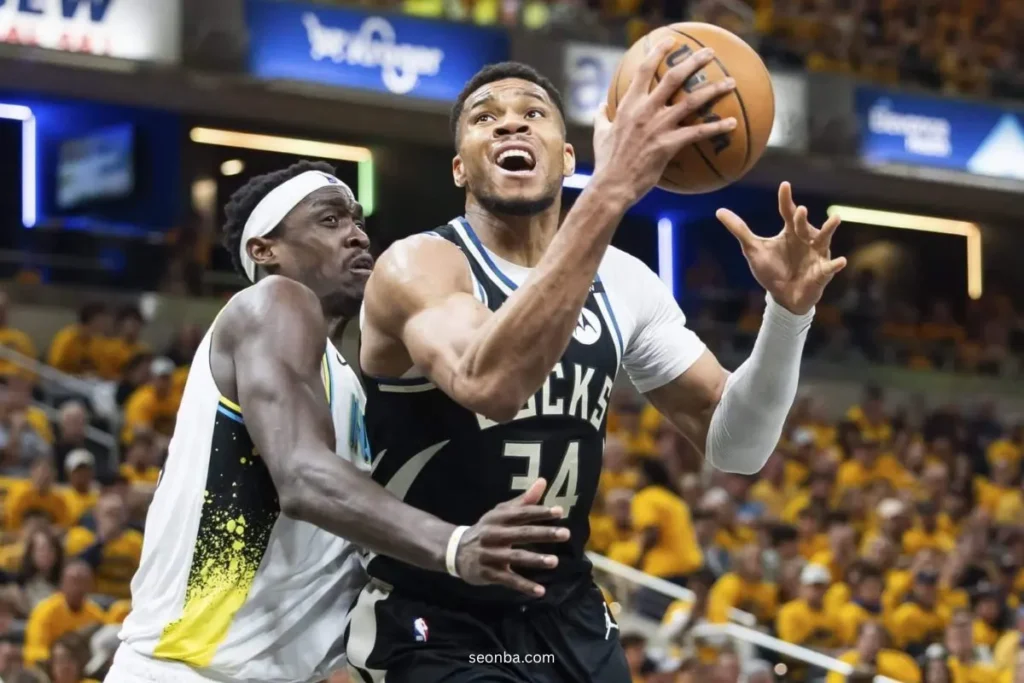Before shocking the league by signing Myles Turner to a four-year, $107 million contract, effectively replacing Brook Lopez as the pick-and-roll rim protector who made perfect sense next to Giannis Antetokounmpo for so many years, the Milwaukee Bucks were an increasingly desperate team with no starting point guard or centre.
By robbing Peter to pay Paul, they’ve “solved” at least one of those difficulties. In order to free up budget room for Turner’s new contract, Milwaukee elected to waive and stretch Damian Lillard’s contract, effectively paying him $22.5 million per year over the next five seasons rather than $113 million over the next two. Um, OK! This could make sense if they had a chance of winning or even competing for a title.
But don’t confuse surprise with cleverness. The Milwaukee Bucks are still a profoundly flawed team with an all-time great player. They still do not have a point guard. Turner is above average at his position, but he did not close many critical games for the Indiana Pacers during their remarkable run to the NBA Finals.
Milwaukee Bucks’ Desperate Gamble and Lillard Fallout
Speaking of which, we’ll get to Indy’s side of the story shortly, but for the time being, it’s difficult not to respect Milwaukee’s dedication to futility. The Milwaukee Bucks have only won one playoff series since winning the championship in 2021, and their attempts to appease Giannis have only pushed them further behind. All they need is a proper scolding from Chief Wiggum. Dig it up, dumb!
While ESPN’s Shams Charania stated that Antetokounmpo was thrilled with Turner’s addition, Chris Haynes reported that Antetokounmpo “is not pleased” with the decision to waive Lillard. He is astute enough to recognise how severely this decision will impair Milwaukee’s long-term flexibility and overall ability to rebuild around him. Maybe he placed pressure on the Milwaukee Bucks behind the scenes and wasn’t willing to go through a weak year or two, but resurrecting last season’s lineup without Lillard and with a more expensive carbon duplicate of Lopez isn’t the stroke of genius they think.
Turner is a strong, big man with a desirable skill set. However, he is not capable of consistently creating looks for himself. Over the last two seasons, he made 39.6 per cent of his three-pointers with Tyrese Haliburton on the court and 29.9 per cent (not good) without him. Who will he run pick-and-rolls with now? Kevin Porter Junior? Gary Trent Junior? Kyle Kuzma?
The fit alone does not justify the contract’s cost, let alone the extreme measures taken to make it happen. Lillard’s dead money will outlast Antetokounmpo’s prime and, most likely, Turner’s whole career in Milwaukee. It’s someone breaking the “break in case of emergency” glass to get a fire hose after the building has already been destroyed.
Before things went awry, those who followed cap details could have turned Milwaukee’s first few days of the offseason into something beneficial. Faced with genuine constraints on their ability to re-sign several of their free agents, the Milwaukee Bucks signed Bobby Portis, Taurean Prince, Trent, and Porter to modest contracts that all contained a player option in the final year. However, clever front-office work will not move the needle for a team that may still make the playoffs—much of what has happened is more sizzle than steak.
Sure, these agreements could be put together in a midseason trade, but the players were originally acquired because their skill sets complemented Antetokounmpo and Lillard. Milwaukee could have used its non-taxpayer midlevel exception before waiving the future Hall of Fame point guard and signing Turner. There’s a chance it could have utilised that salary space on Al Horford or DeAndre Ayton without adding all that long-term weight to its books. Unfortunately, that did not happen.
Take a little detour to address Indiana’s side of this. Now, I realise the Pacers are being chastised for letting Turner depart because they refused to pay the tax; I do agree with the criticism, especially after the team’s unexpected Finals success. However, I believe it stems more from a sense of philosophy than from pragmatism. Turner is fine. He was an important component of Indiana’s success, stood up on defence when it counted, and had stretches where he hit the ball like crazy.
Turner’s effective field goal percentage against the Thunder was a dismal 42.6 per cent, and he struggled to contain OKC’s ball handlers (namely Shai Gilgeous-Alexander, no shame!) on the perimeter. In the conference finals against the New York Knicks, he was destroyed by Karl-Anthony Towns, who was told to guard him one-on-one. The Pacers were a superior club with Turner on the roster, but his departure isn’t the end of the world.
OK, back to Milwaukee. A few final questions: What the hell will it do when Giannis is on the bench? How many teams in the Eastern Conference can credibly say they’re better? Cleveland, New York, Orlando, Atlanta, and Detroit should all be on that list. If you’re feeling generous, Philadelphia probably belongs somewhere on that list, too.
The dust hasn’t cleared elsewhere, but all of this is to imply that Milwaukee’s risk vs. benefit calculation for Myles Turner as a saviour is hopelessly off track. Milwaukee Bucks supporters may be disappointed to read this, but Giannis could still request a trade one day. And if/when that happens, $22.5 million in cap space will be a valuable commodity that they cannot recoup. Making that signing feasible with one of the most ill-advised waive-and-stretch choices in NBA history is the icing on the cake.
You can also discover more insightful and current updates on Hoobae.
You can read more blogs about the latest basketball updates!

